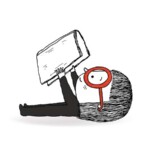Weird Book Girl
by Chasidy Rae Sisk
When I was 18 years old, I began working at a real estate appraisal management company while attending college.
 I planned to work there until I graduated – when I would immediately land a high-profile writing/editing job with a $100,000 starting salary, of course (hahaha, the naivety of youth)! Well, I was wrong, so I hung onto that reliable paycheck for the next 17 years, transitioning from one position to another in an attempt to make myself valuable enough to survive the layoffs that came every couple years. And I excelled in every role, becoming the top performer on my team more often than not. But when I expressed interest in an opening as a team lead (the lowest of management positions), I was discouraged from pursuing it. In fact, one of my managers outright laughed at me, while another told me it wouldn’t be a good fit.
I planned to work there until I graduated – when I would immediately land a high-profile writing/editing job with a $100,000 starting salary, of course (hahaha, the naivety of youth)! Well, I was wrong, so I hung onto that reliable paycheck for the next 17 years, transitioning from one position to another in an attempt to make myself valuable enough to survive the layoffs that came every couple years. And I excelled in every role, becoming the top performer on my team more often than not. But when I expressed interest in an opening as a team lead (the lowest of management positions), I was discouraged from pursuing it. In fact, one of my managers outright laughed at me, while another told me it wouldn’t be a good fit.
See, I was a hard worker, but I didn’t socialize much with my co-workers. I always saw that as a distraction from what I was being paid to do. In fact, I spent my daily breaks walking around or sitting on a bench with a book in my hand. Little did I know, I’d earned myself the moniker “Weird Book Girl.” As time passed, I grew increasingly bored with my position – and along with boredom came discontent; I was miserable because I wasn’t reaching my full potential.
I began searching for a new job, and after only one interview, I received an offer; however, my supervisor (Molly) learned of my plans and came up with an idea: what if I helped write some standard operating procedures (SOPs) for the team? It wasn’t her strong suit, but it would be helpful since we had pretty high turnover at the time. From that endeavor, she recognized that I had an untapped skillset, so she began asking for my help with reports to track the team’s productivity and quality, and when Molly’s team lead left the company, I finally received that promotion. The funny thing was my new role required a lot more interaction with my co-workers…and no one was more surprised than me to find that I had no problem meeting that requirement. And when a supervisor position opened up a couple years later, our manager (Jeanette) offered it to me right away.
By then, I had begun my side hustle as a freelance writer, so I still spent the majority of my breaks being the weird book girl, though it was more likely to find me with a notebook and pencil in hand. But instead of seeing that as a quirk and detriment like past managers did, both Molly and Jeanette viewed it as a strength that also benefited our business since I was constantly learning new things and even applied some of the business, leadership and training knowledge I acquired to what I was doing in our appraisal world.
It’s easy to focus on an employee’s shortcomings in one area without understanding why they may not meet those expectations, but multiple studies have shown that helping employees develop their strengths is a much more effective method of improving overall performance. It also enhances engagement and makes companies more likely to retain those employees. And those are great ways to boost profit!
Because of my experiences early in my career, I went into my supervisory role with a different perspective than my peers had. I viewed each member of my team as an individual, not as cogs in a wheel that were supposed to fit a certain mold. I adapted training as necessary to meet their needs, I delegated tasks to the people who were interested in and equipped to take them on, and I got to know them all and engaged in conversations both professionally and personally…and our previously distressing retention rate soared. In my six years as a supervisor, I only had to fire one associate, and our team saw very little turnover. Every month, we met or exceeded our team goals, even after they were made more stringent.
Playing to my team’s strengths made their jobs more enjoyable, and it made mine easier. When the opportunity arose in 2021 to join the team at Thomas Greco Publishing, my boss and my team expressed sorrow at seeing me leave, but they were also overwhelmingly happy for me to pursue my writing dreams. After all, I’ve always been – and will always be – that weird book girl, but that’s never been the weakness that people used to believe it was. It’s one of my greatest strengths!
So, take a look at your team. Embrace their quirks, focus on their strengths, and reevaluate what you see as their weaknesses. They could have skills you’re not capitalizing on…and that type of short-sightedness might be a weakness worth overcoming!
Want more? Check out the April 2024 issue of Texas Automotive!
